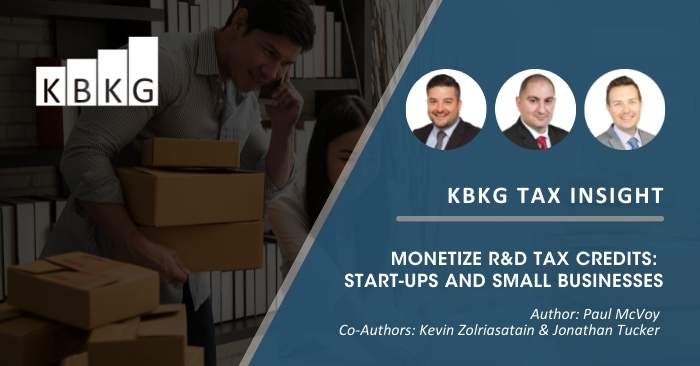The Protecting Americans from Tax Hikes (PATH) Act of 2015 made it possible for start-ups and small businesses to qualify for a tax credit of up to $250,000. Start-ups and small businesses that were previously unable to benefit from the research and development (R&D) tax credits due to lack of taxability should take advantage of the payroll tax liability offset.
Payroll Tax Liability Offset
Effective for tax years beginning after December 31, 2015, Qualified Small Businesses (“QSB”) may elect to use R&D credits to offset up to $250,000 of payroll tax liability. A QSB is a corporation, partnership, or individual with less than $5 million of gross receipts during the taxable year AND did not have gross receipts for any tax year before the fifth tax year ending with the year of the claim. The payroll benefit can be claimed in the first quarter subsequent to filing the prior year income tax return. For example, the earliest an eligible taxpayer filing March 15, 2021, could realize the payroll tax benefit would be with the second quarter Form 941 filed in July.
Form 8974, “Qualified Small Business Payroll Tax Credit for Increasing Research Activities” is used to claim the payroll tax liability offset. The Form 8974 will also act as an intermediary between the revised quarterly employment tax Form 941 and the annual “Credit for Increasing Research Activities” Form 6765 filed with the income tax return. It is important to note the Form 8974 will need to be attached to the employment tax Form 941 for each quarter the R&D credit is applied against the taxpayer’s payroll liability.
Case Study: Qualified Small Business
Founded in 2017, a Company performing R&D activities has been in losses since inception. The Company does not generate an annual income tax liability due to the losses incurred. As such, the Company has not claimed the research credit. In 2020, the Company estimates gross receipts of $2 million with an estimated payroll tax liability of $100,000 in 2021. KBKG’s R&D Tax Credit experts calculated $220,000 of federal research credit. The Company may elect to offset $100,000 of 2021 payroll tax liabilities and carry forward $120,000 of unused R&D credits to offset future payroll tax obligations.
R&D Payroll Tax Credit Calculator
Small businesses and start-ups can try out KBKG’s Research and Development payroll tax credit tool by entering in a few details, such as the total number of employees engaged in R&D and a number of supplies used in R&D, to instantly calculate estimated payroll tax offset. The calculator is available at KBKG.com/research-tax-credits/research-development-payroll-tax-credit-calculator.
Author: Paul McVoy | Co-Authors: Kevin Zolriasatain & Jonathan Tucker
» Download KBKG Tax Insight: Monetize R&D Tax Credits: Start-ups and Small Businesses
About the Authors
 Paul McVoy – Principal
Paul McVoy – Principal
New York
Paul McVoy is a Director for KBKG’s R&D Tax Credit Consulting practice, overseeing the practice form our New York office. In this role, Paul devotes his time to consulting companies in maximizing their R&D tax credit claims. Prior to joining KBKG, Paul was a manager at a Big Four accounting firm out of the Philadelphia, San Diego, and Los Angeles offices. » Full Bio
Co-Authors
 Kevin Zolriasatain – Principal
Kevin Zolriasatain – Principal
Pasadena
Kevin is a Principal and Practice Leader of KBKG’s Research and Development (R&D) Tax Credit Services from our Pasadena headquarters. He has over 14 years of consulting experience providing R&D tax credit services to companies of various sizes. Prior to KBKG, he spent nearly a decade at PricewaterhouseCoopers focusing on securing R&D Tax Credits for Fortune 500 companies. Kevin enjoys working with small to mid-size business owners and over his career has documented hundreds of millions of dollars in research credits. » Full Bio
 Jonathan Tucker – Principal
Jonathan Tucker – Principal
Southeast
Jonathan Tucker is a Principal for KBKG’s R&D Tax Credit Consulting practice. Based in Atlanta, GA, Jon has over fourteen years of experience providing federal business tax advisory services to clients in various industries including technology, manufacturing (including heavy, light, and paper and pulp), transportation, healthcare, retail and consumer products, hospitality, media and entertainment, financial, and other professional services industries. » Full Bio


